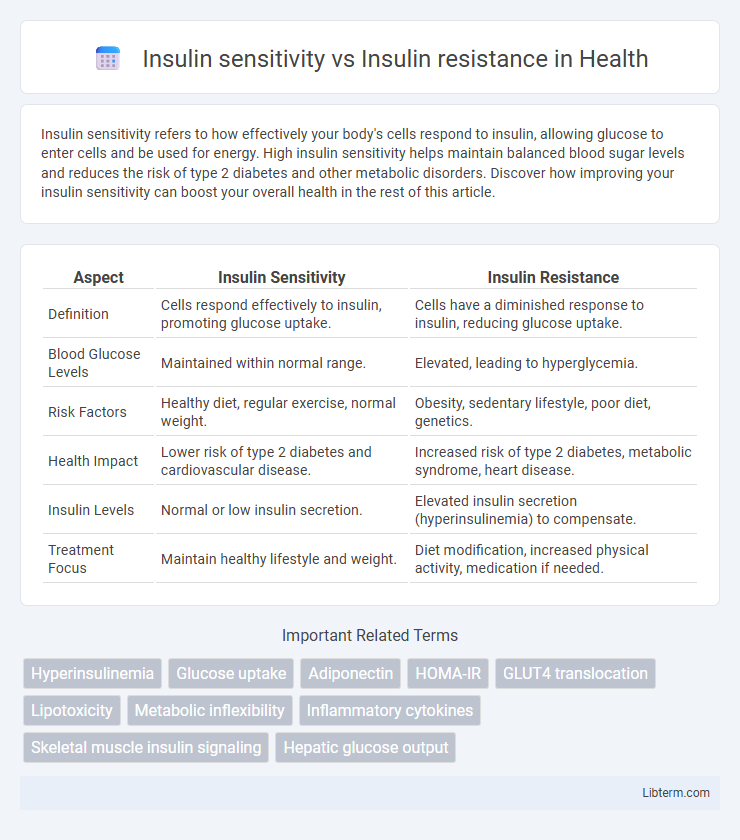Insulin sensitivity refers to how effectively your body's cells respond to insulin, allowing glucose to enter cells and be used for energy. High insulin sensitivity helps maintain balanced blood sugar levels and reduces the risk of type 2 diabetes and other metabolic disorders. Discover how improving your insulin sensitivity can boost your overall health in the rest of this article.
Table of Comparison
| Aspect | Insulin Sensitivity | Insulin Resistance |
|---|---|---|
| Definition | Cells respond effectively to insulin, promoting glucose uptake. | Cells have a diminished response to insulin, reducing glucose uptake. |
| Blood Glucose Levels | Maintained within normal range. | Elevated, leading to hyperglycemia. |
| Risk Factors | Healthy diet, regular exercise, normal weight. | Obesity, sedentary lifestyle, poor diet, genetics. |
| Health Impact | Lower risk of type 2 diabetes and cardiovascular disease. | Increased risk of type 2 diabetes, metabolic syndrome, heart disease. |
| Insulin Levels | Normal or low insulin secretion. | Elevated insulin secretion (hyperinsulinemia) to compensate. |
| Treatment Focus | Maintain healthy lifestyle and weight. | Diet modification, increased physical activity, medication if needed. |
Understanding Insulin Sensitivity and Insulin Resistance
Insulin sensitivity refers to the efficiency with which cells respond to insulin, allowing glucose to enter cells and be used for energy, while insulin resistance occurs when cells fail to respond adequately, leading to elevated blood glucose levels. Maintaining high insulin sensitivity supports metabolic health by improving glucose uptake and reducing the risk of type 2 diabetes. Key factors influencing insulin sensitivity include physical activity, diet, body composition, and genetics.
The Science Behind Insulin Function
Insulin sensitivity refers to how effectively the body's cells respond to insulin, promoting glucose uptake from the bloodstream into muscles and fat tissues, which helps maintain normal blood sugar levels. In contrast, insulin resistance occurs when cells become less responsive to insulin, leading to impaired glucose absorption and elevated blood glucose, often preceding type 2 diabetes. The science behind insulin function involves insulin binding to its receptor on cell surfaces, triggering signaling pathways like the PI3K-Akt pathway that facilitate glucose transporter (GLUT4) translocation to the cell membrane for glucose entry.
Key Differences: Insulin Sensitivity vs Insulin Resistance
Insulin sensitivity refers to how effectively the body's cells respond to insulin, allowing glucose to be absorbed efficiently from the bloodstream. In contrast, insulin resistance occurs when cells have a diminished response to insulin, resulting in elevated blood glucose levels and increased risk of type 2 diabetes. Key differences include the metabolic outcomes: high insulin sensitivity promotes glucose uptake and energy balance, while insulin resistance leads to compensatory hyperinsulinemia and potential metabolic syndrome.
Causes of Insulin Sensitivity and Resistance
Insulin sensitivity occurs when cells effectively respond to insulin, primarily influenced by regular physical activity, balanced diet rich in fiber and antioxidants, and maintaining a healthy weight. Insulin resistance develops due to factors such as excessive visceral fat, chronic inflammation, high sugar intake, sedentary lifestyle, and genetic predisposition. Hormonal imbalances, oxidative stress, and poor sleep quality also contribute significantly to shifting the body from insulin sensitivity to insulin resistance.
Warning Signs and Symptoms
Insulin sensitivity is characterized by the body's efficient use of insulin, while insulin resistance occurs when cells respond poorly to insulin, leading to elevated blood glucose levels. Warning signs of insulin resistance include increased hunger, fatigue, frequent urination, and darkened skin patches known as acanthosis nigricans. Early detection of symptoms such as weight gain around the abdomen, high blood pressure, and elevated fasting blood sugar is crucial for managing insulin resistance and preventing type 2 diabetes.
Health Risks Associated with Insulin Resistance
Insulin resistance is a metabolic condition where cells fail to respond effectively to insulin, leading to elevated blood glucose levels and increased risk of type 2 diabetes, cardiovascular disease, and metabolic syndrome. Chronic insulin resistance contributes to inflammation, hypertension, and dyslipidemia, significantly raising the likelihood of developing heart disease and stroke. Maintaining insulin sensitivity through a balanced diet, regular physical activity, and weight management is crucial for reducing these health risks.
Benefits of Improving Insulin Sensitivity
Improving insulin sensitivity enhances cellular glucose uptake, reducing blood sugar levels and lowering the risk of type 2 diabetes. Enhanced insulin sensitivity supports metabolic health by optimizing fat metabolism and reducing inflammation markers. Increased insulin sensitivity also contributes to better cardiovascular health by improving lipid profiles and reducing arterial plaque buildup.
Lifestyle Factors Affecting Insulin Response
Insulin sensitivity improves with regular physical activity, a balanced diet rich in whole grains, lean proteins, and healthy fats, as well as maintaining a healthy body weight. Conversely, insulin resistance is often linked to sedentary behavior, excessive intake of processed foods high in sugars and unhealthy fats, and chronic stress. Adequate sleep and stress management also play crucial roles in optimizing insulin response and metabolic health.
Nutritional Strategies to Boost Insulin Sensitivity
Improving insulin sensitivity through nutritional strategies involves consuming a diet rich in fiber, whole grains, and healthy fats like omega-3 fatty acids, which help regulate blood sugar levels and enhance glucose uptake by cells. Incorporating low-glycemic index foods such as vegetables, legumes, and nuts reduces insulin spikes and supports balanced insulin function. Avoiding excessive intake of refined sugars and processed carbohydrates is crucial for preventing insulin resistance and maintaining metabolic health.
Long-Term Management and Prevention Tips
Maintaining insulin sensitivity through regular physical activity, a balanced diet rich in fiber, and weight management can significantly reduce the risk of developing insulin resistance and type 2 diabetes. Consistent monitoring of blood glucose levels, stress reduction, and sufficient sleep are essential for long-term prevention of metabolic syndrome. Incorporating foods with a low glycemic index and omega-3 fatty acids supports improved insulin action and minimizes chronic inflammation linked to insulin resistance.
Insulin sensitivity Infographic

 libterm.com
libterm.com